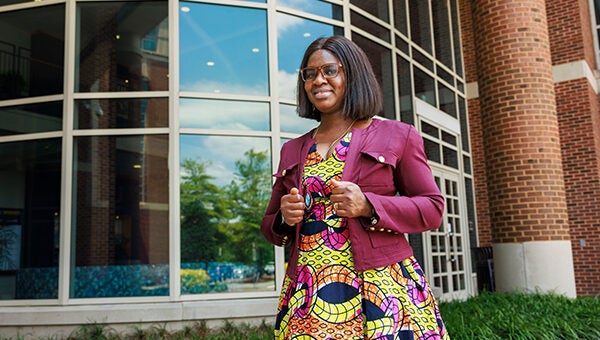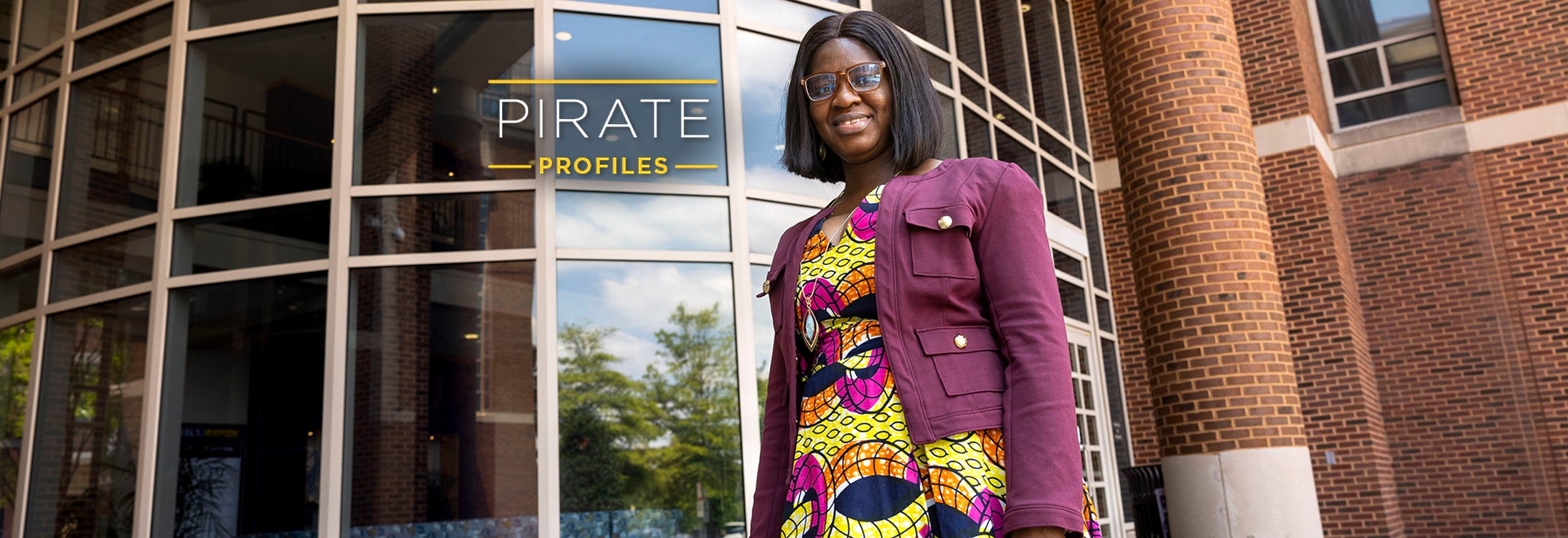Student: Doreen Boateng Sarfo
Pirate Nurse tackles systemic change in health care
When most people look for a new place to work, living near a teaching hospital with a strong relationship with a university’s nursing program isn’t usually at the top of the list of factors. Maybe even lower on that list is moving halfway across the world. But for Doreen Sarfo, a student in East Carolina University’s clinical nurse specialist (CNS) program and a registered nurse at ECU Health, those were exactly the reasons she undertook the arduous process to become a Pirate nurse.

Doreen Sarfo expects to graduate from the clinical nurse specialist program in 2025.
“I wanted a teaching hospital because I wanted to go to school and then probably move into academia later in life,” Sarfo said. “I read a lot about ECU before I took the offer to work for the hospital.”
Sarfo worked as a nurse in her home country of Ghana for more than a decade before applying for a nursing position in the United States. The process to move to the U.S. at the tail end of the COVID-19 pandemic, though, was a just short of an ordeal.
She had two key tasks: be cleared to immigrate to the U.S. and pass the NCLEX exam, which is required for all registered nurses to work in the U.S. — the latter took Sarfo on an odyssey across the continent to take the test. The closest location after South Africa was India, which was unrealistic.
“Within a few days, I had to go to South Africa, and I couldn’t get a straight flight, so it was a 12-hour flight through Ethiopia to South Africa and my flight was delayed for about two hours,” Sarfo said. “We couldn’t land in Ethiopia on our return flight because the weather was bad and we had to go to Kenya for a couple of hours before heading back to Ethiopia. It was quite stressful, but it’s been worth it.”
Sarfo’s education in Ghana included a Bachelor of Science in nursing degree and a postgraduate diploma in education. While working as a nurse in Ghana, she found herself in the operating room, which offered a fascinating opportunity to understand the workings of the human body from the inside.
“You get to feel and see what is described in the books,” Sarfo said. “I’ve touched somebody’s womb, kidney and other internal organs, depending on the surgery — it’s interesting.”
Sarfo’s husband works with ECU’s financial services division, which is responsible for the university’s accounting and budgeting. Her two children, a son who just turned 8 and a daughter who is now 5, have integrated into local schools and are excelling, though there were some adjustments the family had to make, Sarfo said.
“Initially was kind of difficult, especially with the food, but they’re really getting comfortable. They’re making friends and they’re happy,” Sarfo said.
Sarfo works at ECU Health Medical Center in Greenville, supporting the health system’s rehabilitation activities. She hopes to stay working in eastern North Carolina, at least for the foreseeable future.
But now as a graduate student, Sarfo intends to move past the individual patient. She wants to have a role in systemic change across whole patient populations. As a CNS after graduation, she’ll have just that opportunity.
When looking for a graduate program, Sarfo considered the nurse practitioner route but ultimately chose the clinical nurse specialist program as it will allow her to affect health outcomes in the greatest number of patients possible.
“I really want to make an impact and make it be felt. I’m able to build relationships and get them to rally behind me, to do things that need to be done, so I felt it was good to go into,” Sarfo said.
The autonomy and responsibility that nurses are given in the U.S., compared with those in Ghana, is quite different, Sarfo said, but she believes learning to juggle the increased levels of accountability has prepared her to succeed in the CNS program.
“Here, more is expected of the registered nurse. Most of the decisions that providers make depend on what you tell them or what you put in the charts, so you have a lot of work to do,” Sarfo said. “How accurate the information is that you put in the charts will determine what they do, so you have to always be on your toes. You have to be up to speed with things.”
Combining a full-time job, spending time with her family and the frequent travel to Raleigh for her clinical rotations at the Duke Raleigh Hospital is taxing, but getting to experience the cultures of other health systems has been invaluable and the support she has received from her College of Nursing professors has eased the process.
“It’s been amazing from the first day when I interviewed. They’ve been so supportive. There’s a support system for students,” Sarfo said.
Sarfo’s primary instructors are equally complimentary of her as a person, and a future clinical nurse specialist.
“Doreen is an incredibly positive student and individual. She has always joined every meeting or call with a positive attitude and is very engaged,” said Dr. Chelsea Passwater, a clinical associate professor of nursing and the CNS concentration director. “She is enthusiastic about furthering her role and incredibly passionate about her nursing colleagues and patients she works with every day.”
Julie Linder, the department chair of the advanced practice nursing and education department, said that in a short time Sarfo has proven her determination to be the best CNS she can be.
“She has demonstrated a commitment to professional engagement with CNS organizations. She attended the national CNS conference as a first-year student, as well as nurses night at the legislature,” Linder said. “Mrs. Sarfo is just as committed to improving clinical outcomes for patients as demonstrated through her growth as a student in the CNS program.”
In addition to being a College of Nursing graduate student, Sarfo was accepted into the NC Area Health Education Center Scholars Program, which focuses on improving the diversity of health care professionals and their distribution across the state. The two-year program requires participants to complete 40 hours of classroom training and 40 hours of clinical experience, and exposes them to new skill sets and introduces them to “an interprofessional framework that will be crucial to improving health and health care.”
Sarfo is set to graduate as a Clinical Nurse Specialist in May 2025 and has already set her sights on applying to ECU’s Doctor of Nursing Practice program.
“It’s been so exciting. I’m really glad I made the choice to come to ECU,” Sarfo said.
STATISTICS
Name: Doreen Boateng Sarfo
College: College of Nursing
Major: AG-CNS
Age: 36
Classification/Year: May 2025
Hometown: Ghana
Hobbies/interests: Reading, Love to spend time with family and friends.
Clubs and Organizations: Part of Eastern AHEC Scholars
FAVORITES
Favorite place on campus: Laupus Health Sciences Library
Favorite place to eat: Chick-fil-A
Favorite class: I love all the classes so far because they are engaging, challenging and thought provoking.
Professor who influenced you the most: Dr. Julie and Dr. Passwater
Favorite TV show: Family Feud
Favorite band/musician: Cece Winans
Favorite movie: War room
Favorite app: Instagram
MOTIVATIONS
Dream job: Professor of Nursing
Role model: So many people have inspired and touched my life in diverse ways.
Your words to live by: Whatever you do, work heartily, as for the Lord and not for men (Col 3:23).
What advice do you have for other students? Be mindful of the people you associate with because the company you keep, can determine how far you go in life.
What is something cool about ECU that you wish you knew during your first year? There is a great support system for students that helps to review research and other assignments.
